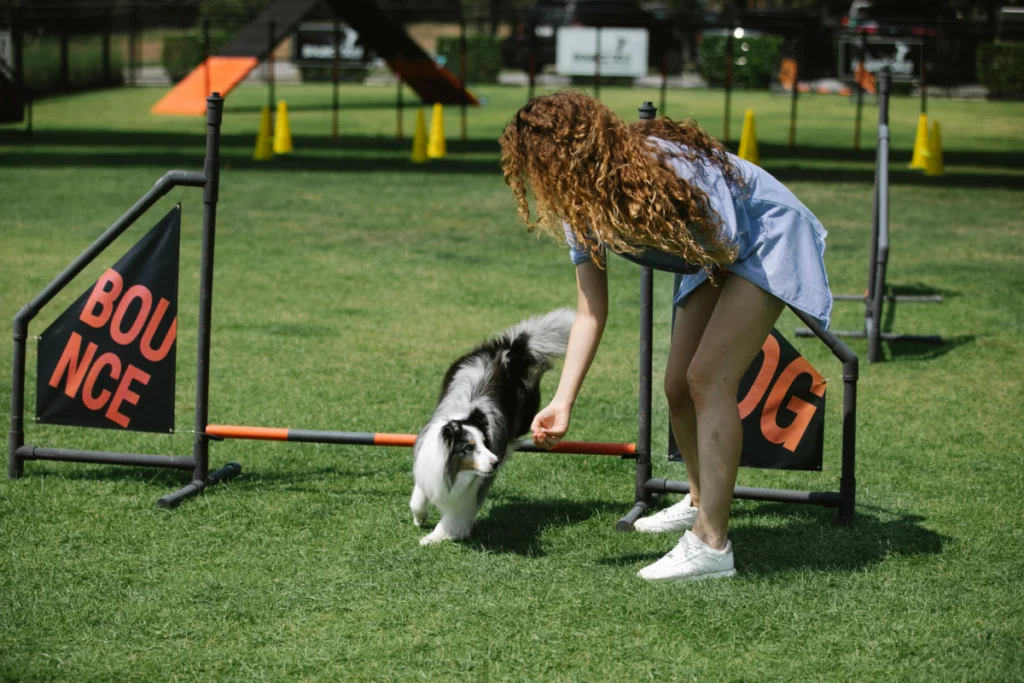Are you a devoted pet parent or an ardent animal lover in the U.S. who dreams of making a tangible difference in the lives of dogs and their human companions? If so, embarking on the journey through certified dog trainer classes might be your perfect calling! In a world where our furry friends are cherished family members, the demand for skilled, ethical, and knowledgeable dog trainers has never been higher. But how do you go from simply loving dogs to becoming a respected professional? This comprehensive guide will walk you through everything you need to know about professional dog trainer certification, from understanding animal behavior to building a thriving career. Ready to turn your passion into a profession? Let’s dive in!
Table of Contents
- The Journey to Becoming a Certified Dog Trainer
- Essential Competencies for a Certified Trainer
- Investment in Your Future: Time and Money
- Diverse Career Opportunities
- Choosing the Right Certified Dog Trainer Classes
- FAQs
- Conclusion
The Journey to Becoming a Certified Dog Trainer
For many aspiring professionals, the first question is often: teaching dog obedience is a passion, but how can I become a dog trainer who truly stands out? The answer lies in professional certification. While it’s true that anyone can call themselves a “dog trainer,” certification is what truly distinguishes a qualified, ethical professional from an amateur. It’s your badge of credibility, demonstrating a solid foundation in animal behavior science, effective training methodologies, and a commitment to humane practices.
Why Certification Matters
Certification isn’t just a piece of paper; it’s a testament to your expertise and dedication. It assures clients that you possess verified knowledge and skills, adhere to professional standards, and are committed to ongoing education. This translates into trust, better results for the dogs and their owners, and a stronger professional reputation. Without certification, it can be challenging to gain the confidence of potential clients who are looking for reliable and responsible guidance for their beloved pets.
Different Paths to Certification
When considering certified dog trainer classes, you’ll find a variety of paths to achieve your goal. Each has its unique benefits and considerations, catering to different learning styles and life situations.
Online Programs
Online courses offer flexibility, allowing you to learn at your own pace from anywhere. They often provide comprehensive theoretical knowledge, virtual lectures, and sometimes even remote practical assessments. This option is ideal for those with busy schedules or limited access to in-person schools.
In-Person Workshops/Schools
For those who thrive in a hands-on environment, in-person schools and workshops provide invaluable practical experience. You’ll work directly with dogs and experienced instructors, receiving immediate feedback and building crucial real-world skills. These programs often offer intensive, immersive learning experiences.
Apprenticeships
An apprenticeship involves learning directly from an experienced, certified dog trainer. This mentorship model provides real-time exposure to client interactions, diverse behavioral cases, and business operations. It’s an excellent way to gain practical skills and industry insights while building professional connections.
Key Certifying Bodies
In the U.S., while there’s no single federal license for dog trainers, several reputable organizations offer recognized certifications. These bodies set industry standards and ensure certified professionals meet specific criteria. Some of the most well-regarded include:
- Certification Council for Professional Dog Trainers (CCPDT): Offers various certifications like CPDT-KA (Knowledge Assessed) and CPDT-KSA (Knowledge and Skills Assessed), requiring extensive experience and passing a comprehensive exam.
- Karen Pryor Academy (KPA): Focuses on positive reinforcement training and offers intensive, hands-on programs leading to certification as a KPA Certified Training Partner (CTP).
- Animal Behavior College (ABC): Provides comprehensive online and in-person programs, including a Dog Trainer Program (ABCDT) that blends theoretical learning with practical experience through mentorship.
- Victoria Stilwell Academy (VSA): Offers a professional dog training course based on positive reinforcement, available both online and through select campuses.
Essential Competencies for a Certified Trainer
How to become a dog trainer who truly excels involves developing a broad set of skills that go beyond just teaching commands. A certified professional understands that successful training is multifaceted, encompassing canine behavior, human communication, and ethical considerations.
Understanding Canine Behavior and Psychology
At the core of effective dog training is a deep comprehension of how dogs learn, why they behave in certain ways, and what motivates them. This includes understanding canine body language, communication signals, breed-specific traits, and the impact of genetics and environment on behavior. Certified trainers use this knowledge to identify the root cause of behavioral issues, not just the symptoms.
Effective Training and Behavior Modification Techniques
A certified trainer is proficient in a range of humane, science-based training methodologies, primarily focusing on positive reinforcement. They can teach basic obedience (sit, stay, come), address common behavioral problems (leash pulling, jumping, barking), and develop complex training plans for specific goals. Their expertise allows them to apply the right technique for each individual dog and situation.
Client Communication and Education
Dog training isn’t just about dogs; it’s also about people. A crucial competency is the ability to effectively communicate with dog owners. Trainers must be skilled at explaining concepts clearly, demonstrating techniques, setting realistic expectations, and empowering owners to continue the training at home. Building rapport and trust with clients is paramount to achieving lasting success.
Recognizing Health-Related Behavioral Issues
Some behavioral problems in dogs can stem from underlying medical conditions. A certified trainer is trained to recognize signs that suggest a veterinary intervention might be necessary. They understand when to refer a client to a veterinarian or a veterinary behaviorist, ensuring the dog’s overall well-being is prioritized and the appropriate professional is consulted for health-related issues.
Investment in Your Future: Time and Money
Becoming a certified dog trainer is an investment, both in terms of time and finances. However, for those passionate about dogs, the returns—both personal and professional—can be incredibly rewarding. Understanding the costs upfront helps in planning your journey effectively.
Program Costs
The cost of certified dog trainer classes varies significantly depending on the program’s intensity, duration, and reputation. Online courses can range from a few hundred to several thousand dollars, while intensive in-person academies or long-term apprenticeships might cost anywhere from $5,000 to over $10,000. These costs typically cover tuition, materials, and sometimes certification exam fees. Remember to factor in travel, accommodation, and living expenses if attending an in-person program away from home.
Time Commitment
The time investment also varies. Some online programs can be completed in a few months if you dedicate significant time, while others might take a year or more. In-person programs can range from intensive multi-week workshops to year-long courses. Apprenticeships can last from several months to a few years, depending on the scope of learning and the mentor’s program. It’s essential to assess your availability and choose a program that fits your life while still providing comprehensive training.
Return on Investment (ROI)
Despite the initial investment, becoming a certified professional significantly enhances your earning potential and career longevity. Certified trainers typically command higher fees, attract more clients due to increased credibility, and have access to a wider range of career opportunities. The satisfaction of helping dogs and their owners lead happier lives, coupled with a sustainable career, often far outweighs the initial financial and time commitment.

Diverse Career Opportunities
Once you complete your certified dog trainer classes and gain your professional credentials, a world of exciting career paths opens up. The field of dog training is dynamic and diverse, allowing you to specialize and find your niche.
Private Training and Group Classes
Many certified trainers establish their own businesses, offering one-on-one private training sessions in clients’ homes or at dedicated facilities. This allows for highly customized training plans. Group classes, such as puppy socialization, basic obedience, or advanced manners, are another popular option, providing a structured learning environment for multiple dogs and owners.
Specialized Training Fields
For those with specific interests, specialization can be a fulfilling path. Certified trainers can delve into areas requiring advanced skills and dedication.
Service Dog Training
This highly specialized field involves training dogs to perform specific tasks for individuals with disabilities, such as guiding the visually impaired, alerting for medical conditions, or providing mobility assistance. It requires extensive knowledge of advanced obedience, task training, and public access skills.
Aggression/Anxiety Management
Working with dogs exhibiting complex behavioral issues like aggression, severe anxiety, or phobias requires a deep understanding of canine psychology and behavior modification. These trainers often collaborate closely with veterinary behaviorists to create comprehensive treatment plans.
Sport/Performance Training
If you’re passionate about canine sports, you can specialize in training dogs for activities like agility, obedience trials, flyball, or scent work. This involves high-level obedience, precision, and understanding the specific requirements of each sport.
Working in Shelters and Rescues
Certified trainers play a vital role in animal shelters and rescue organizations. They help rehabilitate dogs with behavioral challenges, making them more adoptable, and provide training support to new adopters. This work is incredibly rewarding, directly impacting the lives of dogs in need.
Continuing Education and Professional Development
The field of dog behavior is constantly evolving. Certified trainers commit to lifelong learning through workshops, seminars, conferences, and advanced certifications. This dedication ensures they stay updated with the latest scientific research and humane training techniques, continually enhancing their skills and services.
Choosing the Right Certified Dog Trainer Classes
With so many options for certified dog trainer classes, how do you pick the one that’s right for you? It’s a crucial decision that will impact your professional journey. Here are key factors to consider when evaluating programs:
Accreditation and Recognition
Look for programs that are accredited by recognized educational bodies or whose certifications are accepted by reputable professional organizations (like CCPDT, KPA, ABC). This indicates a certain standard of quality and increases the value of your certification in the eyes of future clients and employers.
Curriculum Depth and Practical Experience
A strong program will offer a comprehensive curriculum covering canine learning theory, behavior modification, health, nutrition, and even business skills. Equally important is the practical component. Does the program offer ample opportunities for hands-on training with various dogs? Are there supervised practical sessions, or do they facilitate internships and apprenticeships?
Instructor Expertise and Support
Research the instructors. Do they have strong academic backgrounds, extensive practical experience, and relevant certifications? A supportive learning environment where instructors are accessible for questions and feedback is invaluable. Look for programs that offer mentorship or ongoing support after graduation.
Student Reviews and Success Stories
Before committing, seek out reviews and testimonials from current and former students. What was their experience like? Did the program meet their expectations? What kind of career success have graduates achieved? This feedback can provide real-world insights into the program’s effectiveness and its impact on career development.
FAQs
How long does it take to become a certified dog trainer?
The time it takes to become a certified dog trainer varies widely depending on the chosen path. Online courses or self-study programs can take anywhere from a few months to over a year, depending on your pace. Intensive in-person academies might last from several weeks to a few months, while comprehensive programs or apprenticeships could extend for one to two years or more to fully cover all necessary skills and practical experience.
Is becoming a certified dog trainer worth it?
Yes, for many, becoming a certified dog trainer is absolutely worth it. It provides a rewarding career where you can combine your passion for animals with professional expertise. Certification enhances your credibility, increases earning potential, opens up diverse career opportunities, and allows you to make a significant positive impact on the lives of dogs and their human families. The investment in time and money often yields substantial personal and professional returns.
What is the average salary of a certified dog trainer?
The average salary for a certified dog trainer in the U.S. can vary significantly based on factors like location, experience, specialization, and whether they are self-employed or work for a company. Generally, salaries can range from $30,000 to $60,000 annually, with highly experienced or specialized trainers (e.g., service dog trainers) in high-demand areas potentially earning $70,000 or more per year. Self-employed trainers have the potential for higher earnings based on their client base and pricing structure.
Do I need a degree to become a dog trainer?
No, a specific college degree is generally not required to become a dog trainer. While some trainers may have degrees in animal behavior, zoology, or related fields, it is not a prerequisite for certification or for establishing a successful career. What is crucial is completing reputable certified dog trainer classes, gaining hands-on experience, and obtaining professional certification from recognized bodies. These certifications demonstrate your specialized knowledge and skills to clients and the industry.
Conclusion
The journey to becoming a certified dog trainer is an exciting and fulfilling one, offering a unique opportunity to blend your love for animals with a professional career. By investing in quality certified dog trainer classes, you gain the essential knowledge, practical skills, and ethical understanding required to excel in this field. Certification not only boosts your credibility but also opens doors to a wide array of career opportunities, from private training to specialized roles. For pet owners and enthusiasts dedicated to improving the lives of dogs, taking the step toward professional certification is an invaluable decision that benefits both you and the countless canine companions you’ll help along the way. Embrace this rewarding path and become the trusted expert dogs and their families deserve!





